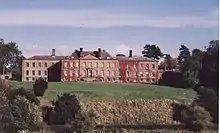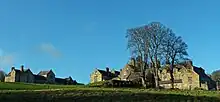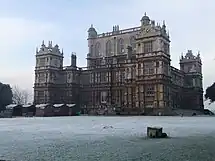David Yale (chancellor)
David Yale (c. 1540–1626) was the Chancellor of Chester, England and a correspondent of Elizabeth Tudor's chief minister, Lord William Cecil of Burghley House. He was also the Vicar General of his in-law, Bishop George Lloyd of Chester. His son, merchant Thomas Yale, became the patriarch of the Yale family of America, and the grandfather of governor Elihu Yale, benefactor of Yale University.


Biography


David Yale was born about 1540 to John Wynn (Yale), heir of Plâs yn Iâl, and was almost certainly an illegitimate son.[1][2] His great-grandfather was Baron Ellis ap Griffith, founder of the House of Yale, and grandphew of Owain Glyndwr, last Welsh Prince of Wales. David's brother was Thomas Yale, who married Elizabeth Mostyn, family of the Mostyn baronets, and his sister was Jane Yale, members of the Yale family.
David was the nephew of Chancellor Thomas Yale and he followed his uncle to Queens' College, Cambridge in 1555. He became a Fellow of the university from 1565 to 1581.[1] On graduating B.A. he was presented to the rectory of Llandegla from 1564 to 1573, and in 1578, he succeeded to his uncle's prebend at St. Asaph Cathedral, taking the degree of Doctor of Law in the following year. He also held a master's degree from Cambridge University.[3]
In July 1578, David Yale, as a fellow from Queens', wrote to William Cecil, Elizabeth's chief minister and Chancellor of Cambridge University, begging that if Dr. William Chaderton (the current President of Queens' College) was made Bishop of Chester, Robert Dudley, 1st Earl of Leicester might not be allowed to exert his influence over the fellows in favour of Humphrey Tyndall, whom he considered to be unfit to be president because of his youth and inexperience.[4][5][6]
Despite his letter, Tyndall was elected President of Queens' College in July 1579 on the recommendation and through the influence of Lord Cecil.[7] With cleric Edmund Meyrick of the Meyrick family, he administered the see of Bangor Cathedral in the vacancy between the episcopates of Bishops Nicholas Robinson and Hugh Bellot of Great Moreton Hall in 1585.[1] He became prebendary of Chester in 1582 and Chancellor of the diocese in 1587, by Lord Bishop William Chaderton.[8]
In 1598 he made extensive purchases of land from the Erddig family of Erddig near Wrexham, Wales, selling some but keeping Plas Grono as the family seat until it was sold by the heirs-at-law of his great-grandson Elihu Yale, benefactor of Yale University in America.[9][1]
They sold the estate, including Erddig House, to Sir George Wynne of Leswood Hall, designed by Francis Smith, an architect of Aston Hall and Sutton Scarsdale Hall, and afterwards, it was sold to John Meller (1665–1733), Master of the High Court of Chancery.[10][11] From 1601 to 1620, Yale was elected Justice of the Peace and in 1607, he became the Vicar General of his in-law, Bishop George Lloyd of Chester.[12] Bishop Lloyd residences were Bishopscourt, Isle of Man and Bishop Lloyd's House in Chester, part of Chester Rows.[13]
Family

David Yale married to Frances Lloyd, daughter of Admiralty Judge John Lloyd, member of the Griffiths of Cevn Amwlch, who rose to power following the struggles of the Wynns of Gwydir.[14][3] Lloyd also cofounded the 1st protestant college at Oxford University with Queen Elizabeth named Jesus College. David's brother-in-law was Knight Simon Weston, a family member of the Willoughbys of Wollaton Hall.[15][2]
David's niece, Elizabeth Weston, was the sister-in-law of Sir Percival Willoughby's son, and aunt of Francis Willughby, father of Cassandra, Duchess of Chandos.[15][2] She was of the family of Jane Austen, author of Pride and Prejudice, through her husband James Brydges, the 1st Duke.
David's uncles were Dr. Griffith Lloyd, Dr. Thomas Yale, Chancellor of the head of the church of England and Ambassador to Queen Elizabeth Tudor, Hugh Yale, Alderman of Oswestry, and Roger Lloyd, Secretary to Cardinal Thomas Wolsey, King Henry VIII's chief minister.[16][17]
His aunt Katherine was a daughter of the Lord of Cymmer-yn-Edeirnion, William ap Griffith Vychan, and another family member, also named David Yale, had been Dean of Bangor Cathedral in 1502.
David's son, Thomas Yale II, married the daughter of Bishop George Lloyd of Chester, and after his death and her remarriage to Theophilus Eaton, Governor of New Haven Colony, she and her children emigrated to America as a reconstituted family.[18][19]
His great-nephew, Thomas Yale, married Dorothy Hughes, daughter of Humphrey Hughes of the Hughes of Gwerclas, 14th Baron of Cymmer-yn-Edeirnion, and their daughter Dorothy Yale, married Hugh Hughes, the 16th Baron.[20][21]
David Yale died in 1626 and was buried at Chester Cathedral, England.
References
- Dodd, A. H., (1959). YALE family, of Plâs yn Iâl and Plas Grono Wrexham. Dictionary of Welsh Biography. Retrieved 4 Sep 2023, from https://biography.wales/article/s-YALE-PLA-1500
- Rodney Horace Yale (1908). "Yale Genealogy and History of Wales. The British Kings and Princes. Life of Owen Glyndwr. Biographies of Governor Elihu Yale". Archive.org. Milburn and Scott company. pp. 86–87–88.
- Plantagenet Ancestry: A Study in Colonial and Medieval Families. Vol. 2. 2011. pp. 554–555. ISBN 9781461045137.
- The First 40 Presidents of Queens' College Cambridge, Their Lives and Times, Jonathan Dowson
- Calendar of State Papers, Domestic Series, of the Reigns of Edward VI, Great Britain, Public Record Office, p. 595
- Searle, William George (1871) The Coins, Tokens and Medals of the Town, County and University of Cambridge, Cambridge Antiquarian Society, p. 332
- Searle, William George (1871). The History of Queens' College of St Margret and St Bernard in the University of Cambridge. Part II. Cambridge: Cambridge University Press.
- Hemingway, Joseph (1831). History of the City of Chester, J. Fletcher, Chester, p. 323
- The Episcopal Administration of Matthew Parker, Archbishop of Canterbury, 1559-1575, p. 95
- Yale, Rodney Horace (1908). Yale Genealogy and History of Wales, Milburn & Scott Company, Nebraska, p. 119
- John Meller (1665–1733), Master of the High Court of Chancery, Charles Jervas (c.1675–1739) and Thomas Gainsborough (1727–1788), National Trust, Erddig
- The Record Society of Lancashire and Cheshire, Quarter Sessions Records, Volume 94, Lancashire and Cheshire, 1940, p. 44
- Bishop Lloyd’s Palace A Grade 1 Listed building in the heart of Chester, HISTORY MONOGRAPH No 4 – ROYALISTS, ROUNDHEADS, RESTORATION AND RECONSTRUCTION c.1615-1774, 2019
- "GRIFFITH family, of Cefn Amwlch, Penllech, Llŷn". www.biography.wales. Dictionary of Welsh Biography.
- Burke, Bernard (1838) A genealogical and heraldic history of the extinct and dormant baronetcies, Scott, Webster, and Geary, London, p. 443
- Burke, Bernard (1863) A Genealogical and Heraldic Dictionary of the Landed Gentry, Part II, Harrison, Pall Mall, London, p. 1715
- Rodney Horace Yale (1908). "Yale Genealogy and History of Wales. The British Kings and Princes. Life of Owen Glyndwr. Biographies of Governor Elihu Yale". Archive.org. Milburn and Scott company. pp. 79–80.
- Henry Whittemore (1897). "The Heroes of the American Revolution and their Descendants". The Heroes of the Revolution Publishing Co. pp. 112–113.
- https://archive.org/details/cu31924007968633/page/n279/mode/2up?q=YALE textsAmerican shrines in England by Story, Alfred Thomas, 1842-1934, 1908, p. 14-16
- Burke, Bernard (1852). "A genealogical and heraldic dictionary of the landed gentry of Great Britain & Ireland for 1852". Colburn and Co., Publishers. p. 1662.
- Lloyd, Jacob Youde William (1887). "The History of the Princes, the Lords Marcher, and the Ancient Nobility of Powys Fadog, and the Ancient Lords of Arwystli, Cedewen, and Meirionydd". Whiting & Co. pp. 45–46.